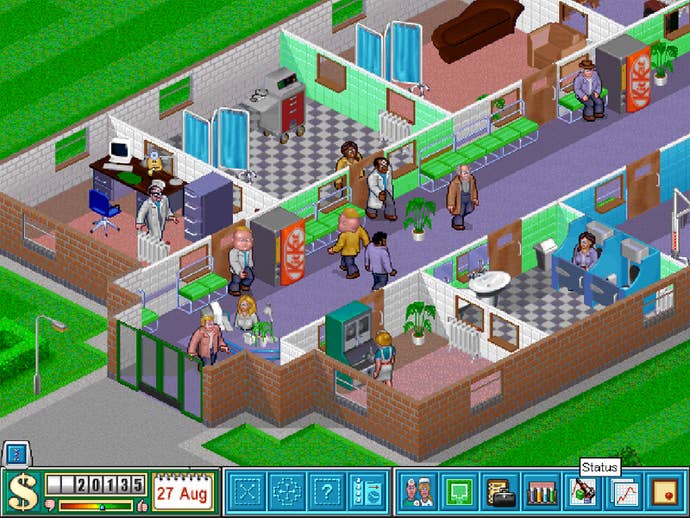Comfort Food Games: Theme Hospital
Bob revisits one of his favorite CMS (construction and management simulation) games and wonders why this addictive little genre didn't get much love after the go-go '90s.
This article first appeared on USgamer, a partner publication of VG247. Some content, such as this article, has been migrated to VG247 for posterity after USgamer's closure - but it has not been edited or further vetted by the VG247 team.
Based on his semi-recent attempts to simulate the behavior of off-putting children, it might be hard to believe Peter Molyneux once ruled the PC gaming scene. But, throughout the late '80s to late '90s, his development studio, Bullfrog Productions, released a succession of amazing games with completely unexpected premises—before being absorbed by EA and withering away. (We really should have seen that one coming.)
Before Molyneux moved on to bigger (but not necessarily better) things, Bullfrog took advantage of the sim-mania sparked by SimCity and SimCity 2000 by releasing their own interpretations of Maxis' idea—except with a little more whimsy. And these games couldn't have found a better audience than me, the kid who wanted a Super Nintendo for SimCity alone. I didn't have ready access to a PC until 1996, though, and by that time, the CMS (construction and management simulation) genre—along with adventure games and first-person-shooters—defined the computer gaming experience as something altogether different than consoles. So I did the best I could to soak up so many of the experiences I missed in my Nintendo-driven days.
Of course, I played and loved both Dungeon Keeper and Theme Park, but the Bullfrog production that stuck with me most would have to be Theme Hospital. To be honest, Dungeon Keeper feels like the best of Bullfrog's legacy, but Theme Hospital has an addictive quality that pokes at the pleasure centers of my brain like no one's business. And, astonishingly, Theme Hospital marks the first Bullfrog Production after the departure of Peter Molyneux, who left after Keeper to form Lionhead Studios, which would make us all shrug collectively in 2001 with the ambitious failure, Black & White. Yet, even without this visionary at the helm, Theme Hospital retains the same endorphin-releasing gameplay loops that quickly turn one-hour sessions with Bullfrog games into all-day marathons.
As the name indicates, Theme Hospital tasks you with managing the various goings-on of a medical center, and, as expected with Bullfrog games, you're given both bureaucratic and godlike powers. Essentially, patients wander into your hospital with an ailment that needs to be identified—though, as in life, some of these issues are immediately apparent—and proceed to go through a gauntlet of tests until they receive the proper treatment that may or may not prevent death. And, as the hospital's director, it's your job to design the layout to be as efficient as possible, employ a skilled staff, and respond to the changing demands of a highly infected populace.
Though these obligations may sound overwhelming, Theme Hospital doesn't dump all of them on you at once. During the early parts of any given level, most patients will arrive with ailments that don't require much specialization: A guy with "gut rot," for instance, would probably only need to visit the GP's office, have one or two diagnostics run on him (via the proper rooms), before returning to the GP, getting his diagnosis, and finally, taking some life-saving medication at the pharmacy. Some diseases require specific rooms engineered for their treatment, like the specialized clinic that pops a patient's "bloaty head" and inflates it to the proper size, while more serious conditions consume a lot more of your hospital's real estate. Patients who need to go under the knife, for instance, require a full operating theater with two skilled surgeons, along with a ward staffed by a nurse. These procedures may net you more money, but they require a greater initial investment.

There's a lot going on in Theme Hospital, yet somehow, it all stays manageable. Once you get into the groove of playing it, each level offers the same familiar cycles, but with new twists to account for with your strategizing. At a certain point, research becomes vital to your hospital's operation (to develop new treatments and equipment, and to make your current ones more effective), as does training doctors yourself. It may take some time, but it's much more affordable to transform a low-skilled doctor into a surgeon than scouring the market for an expensive sawbones.
Really, it's the repetition of Theme Hospital that gets its hooks into me. And while this quality can detract from other games, there's just something compelling about staring at an open floor plan, while thinking about how your dependable assemblage of rooms can tackle the new challenges just around the corner. When you design a hospital that can roll with the punches of the healthcare industry, few games make you feel more satisfied than when healthy patients waltz through those sliding doors after being separated from their money. Only Bullfrog could turn a place where most people go to die into a cheeky adventure in private enterprise, and I miss them dearly for that. Thankfully, Theme Hospital (along with many other Bullfrog games) runs perfectly on any modern PC thanks to the combined efforts of DOSBox and Good Old Games, so you don't have to take my word for it.
But maybe you should—I might not be a doctor, but I've bossed around plenty in a video game.

